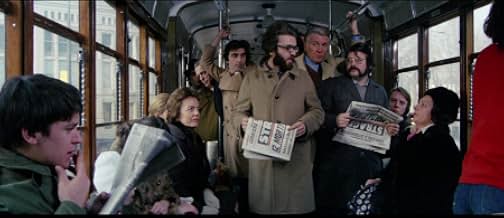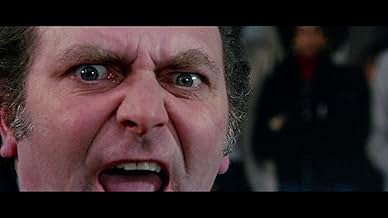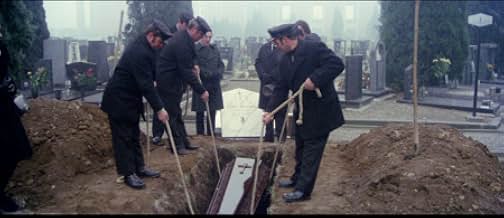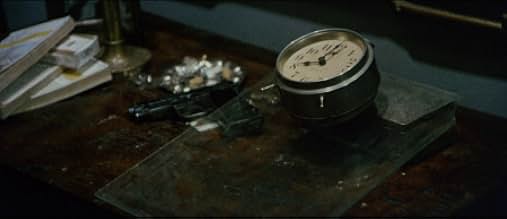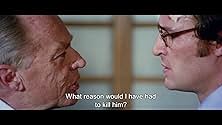अपनी भाषा में प्लॉट जोड़ेंIn a crowded hotel in downtown Milan a bomb has been planted. The timer on its detonator has only minutes to run. A young cop discovers it by accident and is drawn into a terrifying nightmar... सभी पढ़ेंIn a crowded hotel in downtown Milan a bomb has been planted. The timer on its detonator has only minutes to run. A young cop discovers it by accident and is drawn into a terrifying nightmare of intrigue, brutality and ruthless killing.In a crowded hotel in downtown Milan a bomb has been planted. The timer on its detonator has only minutes to run. A young cop discovers it by accident and is drawn into a terrifying nightmare of intrigue, brutality and ruthless killing.
- निर्देशक
- लेखक
- स्टार
Elio Jotta
- Minister
- (as Adelio Jotta)
फ़ीचर्ड समीक्षाएं
Ever since Clint Eastwood delivered that immortal speech in Dirty Harry, Italy; king of cheap rip-off films, began production on a number of cheap crime films; many of which were stylish comic book affairs; but not this one. Despite its rather silly title; Luciano Ercoli's Killer Cop is actually an entirely serious Italian crime thriller (or 'Poliziotteschi'), that handles themes such as murder and terrorism. My main reason for seeing this film was because it's directed by Luciano Ercoli; the same underrated director behind the unfairly criticised 'Death Walks at Midnight', and the supremely sexy 'The Forbidden Photos of a Lady Above Suspicion'. However, I'm also becoming a big fan of Italian crime films (already a big fan of Giallo), and this is one of the best that I've seen. Typically for Italian cinema, the plot is overly complicated; and it picks up after the explosion of a bomb in a hotel lobby. We then follow the convoluted investigation into the bombing through the eyes of a young police detective.
Luciano Ercoli only directed a handful of films, and that's a shame as he did a really good job with his Giallo's, and this film makes a mark too. It can be a bit irritating at times, as several plot threads that don't really go anywhere creep into the plot; but Ercoli orchestrates it well, and several scenes; such as the end shoot-out in a train station and an earlier pivotal scene in a hotel room are tense and exciting. Ercoli does well in implementing a good gritty atmosphere, which bodes well with the idea of someone callously blowing up a hotel lobby. The investigation into the crime is well rounded, and although there is too much emphasis on the police procedure at times, the film mostly manages to stay away from boredom for its ninety minute duration. Claudio Cassinelli puts in a good lead performance and receives good feedback from a host of lesser known actors; although unlike most Italian films, this one doesn't feature much female flesh; and it's a shame that there's no role for Ercoli's muse, Susan Scott. Overall, while this isn't a top quality Italian film - it's certainly good enough to warrant tracking down and comes recommended to fans of Italian cinema.
Luciano Ercoli only directed a handful of films, and that's a shame as he did a really good job with his Giallo's, and this film makes a mark too. It can be a bit irritating at times, as several plot threads that don't really go anywhere creep into the plot; but Ercoli orchestrates it well, and several scenes; such as the end shoot-out in a train station and an earlier pivotal scene in a hotel room are tense and exciting. Ercoli does well in implementing a good gritty atmosphere, which bodes well with the idea of someone callously blowing up a hotel lobby. The investigation into the crime is well rounded, and although there is too much emphasis on the police procedure at times, the film mostly manages to stay away from boredom for its ninety minute duration. Claudio Cassinelli puts in a good lead performance and receives good feedback from a host of lesser known actors; although unlike most Italian films, this one doesn't feature much female flesh; and it's a shame that there's no role for Ercoli's muse, Susan Scott. Overall, while this isn't a top quality Italian film - it's certainly good enough to warrant tracking down and comes recommended to fans of Italian cinema.
A solid cop thriller gets dragged down by a bomb, here great lovelable performances are ruined by the worst bomb explosion I have ever seen, no fire random things explofding, no blood. What went wrong here i don't know, but an ambitios attenmpt to creat something different just lost all purpose.
I struggled to get passed the bomb trauma, the rest of the film was solid, but all i'll ever remember is that bomb.
I struggled to get passed the bomb trauma, the rest of the film was solid, but all i'll ever remember is that bomb.
The director of Death Walks On High Heels tries his hand at the crime genre and gives us a film that to me has the same tone and pace as his gialli. That's not a bad thing, mind you, but this is a more realistic film that you'd expect from the Eurocrime genre.
Cassanelli plays a narcotics detective who keeps caught up in something more complex than drug trafficking when, while tailing a dealer, a young myopic kid runs into the hotel the dealer is staying at, trying to get everyone to run from a bomb he claims is planted there. He runs off before the bomb explodes, killing a dozen people and setting Cassanelli on a path to find the short sighted kid based purely on the glasses he left behind. Trouble ensues as Arthur Kennedy is put in charge of the investigation...and he still playing the stubborn cop from the Living Dead At the Manchester Morgue! That means he hates Cassanelli and won't listen to him, by the way.
We also get to meet the bombers and a shadowy organisation that seem to be behind it all, a plot device that's occurring quite frequently in 1975's Italian crime films. Director Ercoli does throw in the odd bit of quirkiness, like the blind kid having to go to an opticians for new glasses and nearly getting caught, only for him to spend the rest of the film with those steel frames they make you wear while testing lenses. There's also a lot of focus on Cassanelli's investigation and a lot of time spent on his partner's nervous disorder following someone holding a gun on him, so don't expect massive shootouts or car chases.
HD is not kind to Arthur Kennedy I notice. Cassanelli still looks hunky though.
Cassanelli plays a narcotics detective who keeps caught up in something more complex than drug trafficking when, while tailing a dealer, a young myopic kid runs into the hotel the dealer is staying at, trying to get everyone to run from a bomb he claims is planted there. He runs off before the bomb explodes, killing a dozen people and setting Cassanelli on a path to find the short sighted kid based purely on the glasses he left behind. Trouble ensues as Arthur Kennedy is put in charge of the investigation...and he still playing the stubborn cop from the Living Dead At the Manchester Morgue! That means he hates Cassanelli and won't listen to him, by the way.
We also get to meet the bombers and a shadowy organisation that seem to be behind it all, a plot device that's occurring quite frequently in 1975's Italian crime films. Director Ercoli does throw in the odd bit of quirkiness, like the blind kid having to go to an opticians for new glasses and nearly getting caught, only for him to spend the rest of the film with those steel frames they make you wear while testing lenses. There's also a lot of focus on Cassanelli's investigation and a lot of time spent on his partner's nervous disorder following someone holding a gun on him, so don't expect massive shootouts or car chases.
HD is not kind to Arthur Kennedy I notice. Cassanelli still looks hunky though.
Those who already had the (dis-)pleasure of reading some of my reviews might know that I have a bizarre fetish for the original, almost poetic sounding and native-language titles of Italian cult movies, whereas I have a natural aversion for the commercial, unimaginative and downright irrelevant retitling in English. Quite often, it's really preferable to just literally translate the Italian title rather than to go by the international English title. The theory definitely also stands for Luciano Ercoli's exquisite thriller "La Polizia Ha Le Mani Legate". The film is commonly known as "Killer Cop", but that is - bluntly said - a horrendous title. It makes the film sound like a hyper-violent Poliziotesschi, like Umberto Lenzi or Stelvio Massi usually made them with Maurizio Merli in the lead role, but it's much more of an intelligent and slow-brooding political thriller. Also, come to think of it, the title "Killer Cop" reveals things you're not supposed to know. The original title translates as "The hands of the police are tied" and, as usual, it's a much better and meaningful description of the overall movie.
As mentioned already, this isn't the type of contemporary Italian thriller that thrives on virulent car chases, extreme gratuitous violence or heroic coppers sadistically massacring kidnappers and drug-dealers. Instead, it's a very tense and delicate tale in which a young commissioner (Claudio Cassinelli) and a veteran district attorney (Arthur Kennedy), independently from each other, try to uncover who set off a powerful bomb in the lobby of a crowded hotel full of elite and international guests, and why this act of terrorism was committed. There isn't a lot of action in Ercoli's film, but the plot is unimaginably compelling, and I often found myself at the edge of my seat during the pivot sequences. There are a handful of unforgettable sequences, like shortly after the explosion in the hotel when the camera slowly zooms in one almost all the casualties, or the exhilarating chase in the subway station.
Luciano Ercoli perhaps isn't the most known or prominent Italian cult director from the early 70s, but it's nevertheless already the fourth film of his that I absolutely adored! Sadly, this is his only (sort of) Poliziotesschi, but he did make three wondrous gems in that other favorite Italian sub genre of mine; - the Giallo. These were "Forbidden Photos of a Lady above Suspicion", "Death Walks on High Heels" and "Death Walks at Midnight". That man earned the Nobel price of literature for his titles alone.
As mentioned already, this isn't the type of contemporary Italian thriller that thrives on virulent car chases, extreme gratuitous violence or heroic coppers sadistically massacring kidnappers and drug-dealers. Instead, it's a very tense and delicate tale in which a young commissioner (Claudio Cassinelli) and a veteran district attorney (Arthur Kennedy), independently from each other, try to uncover who set off a powerful bomb in the lobby of a crowded hotel full of elite and international guests, and why this act of terrorism was committed. There isn't a lot of action in Ercoli's film, but the plot is unimaginably compelling, and I often found myself at the edge of my seat during the pivot sequences. There are a handful of unforgettable sequences, like shortly after the explosion in the hotel when the camera slowly zooms in one almost all the casualties, or the exhilarating chase in the subway station.
Luciano Ercoli perhaps isn't the most known or prominent Italian cult director from the early 70s, but it's nevertheless already the fourth film of his that I absolutely adored! Sadly, this is his only (sort of) Poliziotesschi, but he did make three wondrous gems in that other favorite Italian sub genre of mine; - the Giallo. These were "Forbidden Photos of a Lady above Suspicion", "Death Walks on High Heels" and "Death Walks at Midnight". That man earned the Nobel price of literature for his titles alone.
Luciano Ercoli's La polizia ha le mani legate is a slow-burning political thriller that unravels like a twisted game of cat and mouse. It's a gritty, intelligent take on the "poliziotteschi" genre, offering a more nuanced and brooding experience than the typical hyper-violent entries. With a story inspired by the 1969 bombing of the Banca Nazionale dell'Agricoltura in Milan, the film follows Commissioner Matteo Rolandi, a narcotics officer drawn into the complex web of the bombing investigation.
Ercoli masterfully builds tension throughout the film, orchestrating several gripping scenes. The end shootout in a train station and a pivotal hotel room encounter are highlights, showcasing the director's ability to craft intense and exciting moments. The film also effectively captures the atmosphere of the time, with a sense of urgency and political unrest lurking in the background.
While the film excels in creating tension and atmosphere, it stumbles slightly in its pacing and plot threads. Some scenes feel drawn-out, and there are a few narrative tangents that don't add much to the overall story. Despite this, Ercoli's direction keeps the film engaging, and the strong performances from the cast, especially Claudio Cassinelli as Rolandi, help elevate the material.
The film's title, literally translated as "The Police Can't Move," is a fitting representation of the story's theme of bureaucratic red tape and the challenges faced by those seeking justice. It's a thought-provoking commentary on the complexities of investigating a terrorist attack and the limitations of the system.
However, the film may not satisfy those seeking a typical action-packed cop thriller. The violence is understated, and the focus is more on the political implications and the human stories behind the tragedy. The "killer cop" moniker that the film has acquired in some regions is misleading, as there is no such character in the traditional sense.
In conclusion, La polizia ha le mani legate is a thoughtful and atmospheric political thriller that offers a different take on the "poliziotteschi" genre. While it has its pacing issues and may not appeal to those seeking mindless action, it excels in building tension and providing a nuanced narrative.
Ercoli masterfully builds tension throughout the film, orchestrating several gripping scenes. The end shootout in a train station and a pivotal hotel room encounter are highlights, showcasing the director's ability to craft intense and exciting moments. The film also effectively captures the atmosphere of the time, with a sense of urgency and political unrest lurking in the background.
While the film excels in creating tension and atmosphere, it stumbles slightly in its pacing and plot threads. Some scenes feel drawn-out, and there are a few narrative tangents that don't add much to the overall story. Despite this, Ercoli's direction keeps the film engaging, and the strong performances from the cast, especially Claudio Cassinelli as Rolandi, help elevate the material.
The film's title, literally translated as "The Police Can't Move," is a fitting representation of the story's theme of bureaucratic red tape and the challenges faced by those seeking justice. It's a thought-provoking commentary on the complexities of investigating a terrorist attack and the limitations of the system.
However, the film may not satisfy those seeking a typical action-packed cop thriller. The violence is understated, and the focus is more on the political implications and the human stories behind the tragedy. The "killer cop" moniker that the film has acquired in some regions is misleading, as there is no such character in the traditional sense.
In conclusion, La polizia ha le mani legate is a thoughtful and atmospheric political thriller that offers a different take on the "poliziotteschi" genre. While it has its pacing issues and may not appeal to those seeking mindless action, it excels in building tension and providing a nuanced narrative.
क्या आपको पता है
- ट्रिवियाItalian censorship visa # 66264 delivered on 27-3-1975.
- कनेक्शनReferenced in Mark il poliziotto spara per primo (1975)
टॉप पसंद
रेटिंग देने के लिए साइन-इन करें और वैयक्तिकृत सुझावों के लिए वॉचलिस्ट करें
विवरण
- चलने की अवधि1 घंटा 37 मिनट
- रंग
- पक्ष अनुपात
- 2.35 : 1
इस पेज में योगदान दें
किसी बदलाव का सुझाव दें या अनुपलब्ध कॉन्टेंट जोड़ें

टॉप गैप
By what name was La polizia ha le mani legate (1975) officially released in India in English?
जवाब

